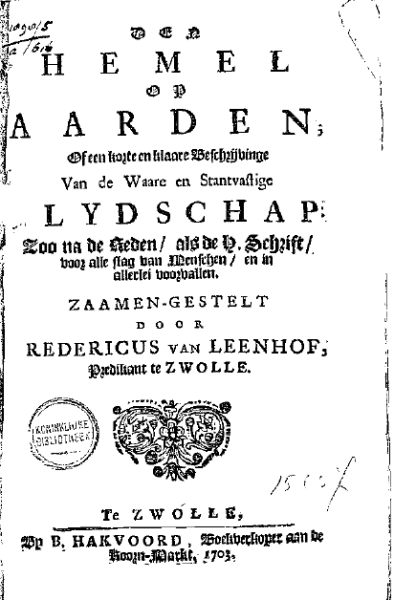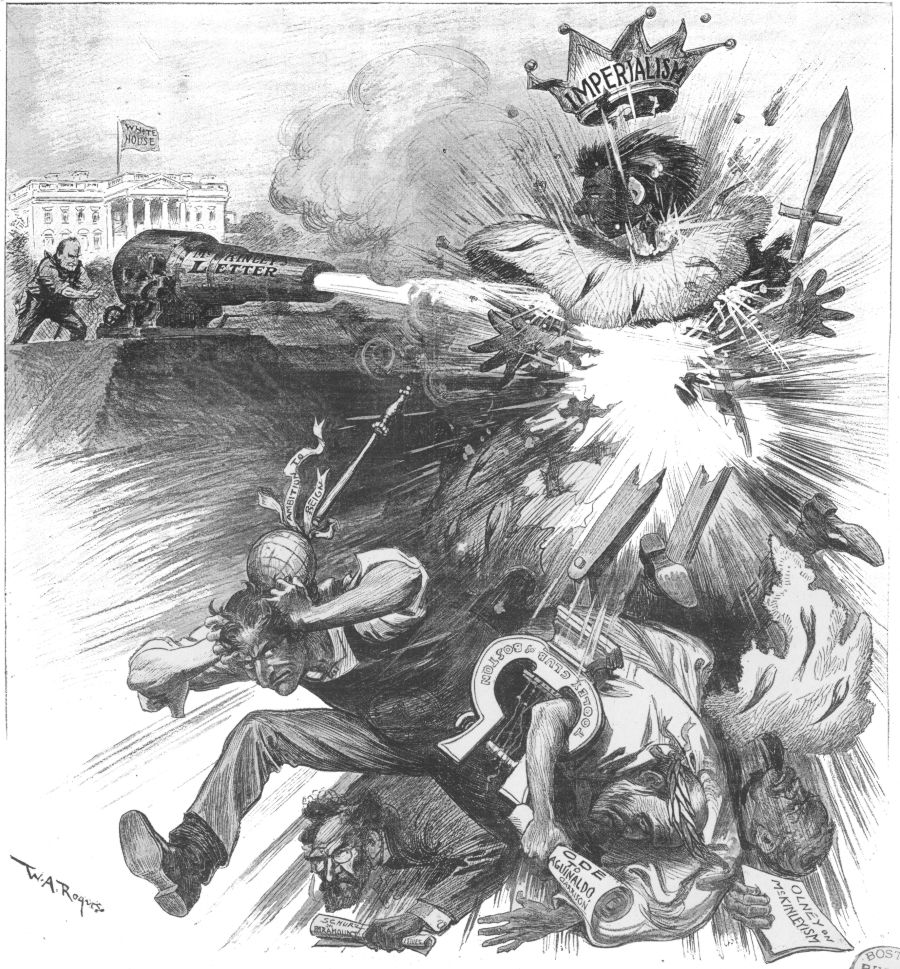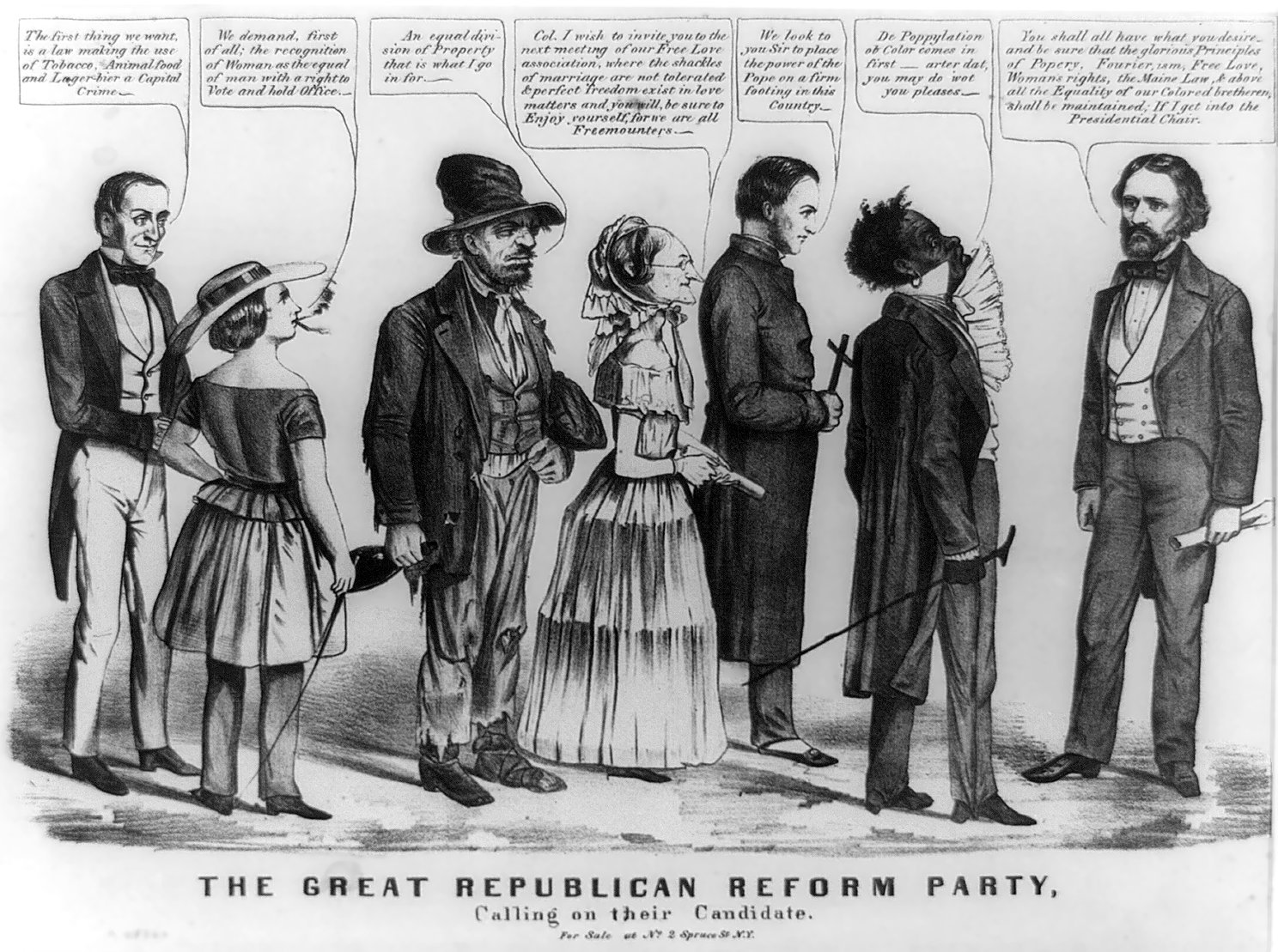|
Frederik Van Leenhof
Frederik van Leenhof (1 September 1647 – 13 October 1715) was a Dutch pastor and philosopher active in Zwolle, who caused an international controversy because of his Spinozist work ''Heaven on Earth'' (1703). This controversy is extensively discussed in Jonathan Israel's 2001 book ''Radical Enlightenment''. Education and career Leenhof studied theology in the 1660s at Utrecht University under Voetius, and at Leiden University under Cocceius during the Voetian–Cocceian dispute. He served as pastor in Abbeville (1670–71), Nieuwvliet (1672–78) and Velsen (1680–81), before finally settling in Zwolle in 1681. During his first period of writing from 1673 until 1684, he fervently chose the side of the Cartesio-Cocceians against Voetian fundamentalism. He accused his opponents of smear tactics and straw men, denying the claim 'that out of Descartes' school come atheists and libertines'. However, a letter correspondence with Christopher Wittich (briefly his host in Leiden s ... [...More Info...] [...Related Items...] OR: [Wikipedia] [Google] [Baidu] |
Middelburg, Zeeland
Middelburg () is a List of cities in the Netherlands by province, city and List of municipalities of the Netherlands, municipality in the south-western Netherlands serving as the Capital (political), capital of the Provinces of the Netherlands, province of Zeeland. Situated on the central peninsula of the Zeeland province, ''Midden-Zeeland'' (consisting of former islands Walcheren, Noord-Beveland and Zuid-Beveland), it has a population of about 48,000. The city lies as the crow flies about 75 km south west of Rotterdam, 60 km north west of Antwerp and 40 km north east of Bruges. In terms of technology, Middelburg played a role in the Scientific Revolution at the early modern period. The town was historically a center of Lens (optics), lens crafting in the Dutch Golden Age, Golden Age of Dutch science and technology. The invention of the microscope and invention of the telescope, telescope is often credited to Middelburg spectacle-makers (including Zacharias Janssen and Hans Lippersh ... [...More Info...] [...Related Items...] OR: [Wikipedia] [Google] [Baidu] |
Abbeville
Abbeville (, vls, Abbekerke, pcd, Advile) is a commune in the Somme department and in Hauts-de-France region in northern France. It is the chef-lieu of one of the arrondissements of Somme. Located on the river Somme, it was the capital of Ponthieu. Its inhabitants are called the ''Abbevillois''. Geography Location Abbeville is located on the river Somme, from its modern mouth in the English Channel. The majority of the town is located on the east bank of the Somme, as well as on an island. It is located at the head of the Abbeville Canal, and is northwest of Amiens and approximately from Paris. It is also as the crow flies from the and the English Channel. In the medieval period, it was the lowest crossing point on the Somme and it was nearby that Edward III's army crossed shortly before the Battle of Crécy in 1346. Just halfway between Rouen and Lille, it is the historical capital of the County of Ponthieu and maritime Picardy. Quarters, hamlets and local ... [...More Info...] [...Related Items...] OR: [Wikipedia] [Google] [Baidu] |
Epicureanism
Epicureanism is a system of philosophy founded around 307 BC based upon the teachings of the ancient Greek philosopher Epicurus. Epicureanism was originally a challenge to Platonism. Later its main opponent became Stoicism. Few writings by Epicurus have survived. However, there are independent attestations of his ideas from his later disciples. Some scholars consider the epic poem ''De rerum natura'' (Latin for ''On the Nature of Things'') by Lucretius to present in one unified work the core arguments and theories of Epicureanism. Many of the scrolls unearthed at the Villa of the Papyri at Herculaneum are Epicurean texts. At least some are thought to have belonged to the Epicurean philosopher Philodemus. Epicurus also had a wealthy 2nd-century AD disciple, Diogenes of Oenoanda, who had a portico wall inscribed with tenets of the philosophy erected in Oenoanda, Lycia (present day Turkey). Epicurus was an atomic materialist, following in the steps of Democritus. His materialis ... [...More Info...] [...Related Items...] OR: [Wikipedia] [Google] [Baidu] |
Stoicism
Stoicism is a school of Hellenistic philosophy founded by Zeno of Citium in Athens in the early 3rd century Common Era, BCE. It is a philosophy of personal virtue ethics informed by its system of logic and its views on the natural world, asserting that the practice of virtue is both necessary and sufficient to achieve Eudaimonia, (happiness, ): one flourishes by living an Ethics, ethical life. The Stoics identified the path to with a life spent practicing the cardinal virtues and living in accordance with nature. The Stoics are especially known for teaching that "virtue is the only good" for human beings, and that external things, such as health, wealth, and pleasure, are not good or called in themselves (''adiaphora'') but have value as "material for virtue to act upon". Alongside Aristotelian ethics, the Stoic tradition forms one of the major founding approaches to virtue ethics. The Stoics also held that certain destructive emotions resulted from errors of judgment, and th ... [...More Info...] [...Related Items...] OR: [Wikipedia] [Google] [Baidu] |
Age Of Enlightenment
The Age of Enlightenment or the Enlightenment; german: Aufklärung, "Enlightenment"; it, L'Illuminismo, "Enlightenment"; pl, Oświecenie, "Enlightenment"; pt, Iluminismo, "Enlightenment"; es, La Ilustración, "Enlightenment" was an intellectual and philosophical movement that dominated Europe in the 17th and 18th centuries with global influences and effects. The Enlightenment included a range of ideas centered on the value of human happiness, the pursuit of knowledge obtained by means of reason and the evidence of the senses, and ideals such as liberty, progress, toleration, fraternity, and constitutional government. The Enlightenment was preceded by the Scientific Revolution and the work of Francis Bacon, John Locke, and others. Some date the beginning of the Enlightenment to the publication of René Descartes' ''Discourse on the Method'' in 1637, featuring his famous dictum, ''Cogito, ergo sum'' ("I think, therefore I am"). Others cite the publication of Isaac Newto ... [...More Info...] [...Related Items...] OR: [Wikipedia] [Google] [Baidu] |
Dualistic Cosmology
Dualism in cosmology or dualistic cosmology is the moral or spiritual belief that two fundamental concepts exist, which often oppose each other. It is an umbrella term that covers a diversity of views from various religions, including both traditional religions and scriptural religions. Moral dualism is the belief of the great complement of, or conflict between, the benevolent and the malevolent. It simply implies that there are two moral opposites at work, independent of any interpretation of what might be "moral" and independent of how these may be represented. Moral opposites might, for example, exist in a worldview that has one god, more than one god, or none. By contrast, duotheism, bitheism or ditheism implies (at least) two gods. While bitheism implies harmony, ditheism implies rivalry and opposition, such as between good and evil, or light and dark, or summer and winter. For example, a ditheistic system could be one in which one god is a creator and the other a destroyer. I ... [...More Info...] [...Related Items...] OR: [Wikipedia] [Google] [Baidu] |
Creation Ex Nihilo
(Latin for "creation out of nothing") is the doctrine that matter is not eternal but had to be created by some divine creative act. It is a theistic answer to the question of how the universe comes to exist. It is in contrast to ''Ex nihilo nihil fit'' or "nothing comes from nothing", which means that all things were formed from preexisting things; an idea by the Greek philosopher Parmenides (c.540-480 BC) about the nature of all things, and later more formally stated by Titus Lucretius Carus (c. 99 – c. 55 BC) Theology ''Ex nihilo nihil fit'': uncreated matter ''Ex nihilo nihil fit'' means that nothing comes from nothing. In ancient creation myths the universe is formed from eternal formless matter, namely the dark and still primordial ocean of chaos. In Sumerian myth this cosmic ocean is personified as the goddess Nammu "who gave birth to heaven and earth" and had existed forever; in the Babylonian creation epic Enuma Elish pre-existent chaos is made up of fresh-water Ap ... [...More Info...] [...Related Items...] OR: [Wikipedia] [Google] [Baidu] |
Leiden
Leiden (; in English and archaic Dutch also Leyden) is a city and municipality in the province of South Holland, Netherlands. The municipality of Leiden has a population of 119,713, but the city forms one densely connected agglomeration with its suburbs Oegstgeest, Leiderdorp, Voorschoten and Zoeterwoude with 206,647 inhabitants. The Netherlands Central Bureau of Statistics (CBS) further includes Katwijk in the agglomeration which makes the total population of the Leiden urban agglomeration 270,879, and in the larger Leiden urban area also Teylingen, Noordwijk, and Noordwijkerhout are included with in total 348,868 inhabitants. Leiden is located on the Oude Rijn, at a distance of some from The Hague to its south and some from Amsterdam to its north. The recreational area of the Kaag Lakes (Kagerplassen) lies just to the northeast of Leiden. A university city since 1575, Leiden has been one of Europe's most prominent scientific centres for more than four centuries. Leide ... [...More Info...] [...Related Items...] OR: [Wikipedia] [Google] [Baidu] |
Christopher Wittich
Christoph Wittich or Christophorus Wittichius (1625, in Brieg – 1687, in Leiden) was a Dutch theologian. He is known for attempting to reconcile Descartes' philosophy with the Scriptures. Life He studied theology in Bremen, Groningen and Leiden, and taught theology, mathematics, and Hebrew at Herborn (1651–53), Duisburg Duisburg () is a city in the Ruhr metropolitan area of the western German state of North Rhine-Westphalia. Lying on the confluence of the Rhine and the Ruhr rivers in the center of the Rhine-Ruhr Region, Duisburg is the 5th largest city in No ... (1653–55), Nijmegen (1655–1671) and Leiden (1671–1687). Starting from his 1653 publication ''Dissertationes Duæ'' he defended a non-literal interpretation of the Bible texts that were quoted by Voetius to prove the unscriptural nature of Descartes' Copernican beliefs, and tried to reconcile philosophy and theology. Works *''Dissertationes Duæ'', Amsterdam, 1653. *''De Stylo Scripturae'', Amsterda ... [...More Info...] [...Related Items...] OR: [Wikipedia] [Google] [Baidu] |
Atheism
Atheism, in the broadest sense, is an absence of belief in the existence of deities. Less broadly, atheism is a rejection of the belief that any deities exist. In an even narrower sense, atheism is specifically the position that there no deities. Atheism is contrasted with theism, which in its most general form is the belief that at least one deity exists. The first individuals to identify themselves as atheists lived in the 18th century during the Age of Enlightenment. The French Revolution, noted for its "unprecedented atheism", witnessed the first significant political movement in history to advocate for the supremacy of human reason.Extract of page 22 In 1967, Albania declared itself the first official atheist coun ... [...More Info...] [...Related Items...] OR: [Wikipedia] [Google] [Baidu] |
Straw Man
A straw man (sometimes written as strawman) is a form of argument and an informal fallacy of having the impression of refuting an argument, whereas the real subject of the argument was not addressed or refuted, but instead replaced with a false one. One who engages in this fallacy is said to be "attacking a straw man". The typical straw man argument creates the illusion of having refuted or defeated an opponent's proposition through the covert replacement of it with a different proposition (i.e., "stand up a straw man") and the subsequent refutation of that false argument ("knock down a straw man") instead of the opponent's proposition. Straw man arguments have been used throughout history in polemical debate, particularly regarding highly charged emotional subjects. Straw man tactics in the United Kingdom may also be known as an Aunt Sally, after a pub game of the same name, where patrons throw sticks or battens at a post to knock off a skittle balanced on top. Structure Th ... [...More Info...] [...Related Items...] OR: [Wikipedia] [Google] [Baidu] |
Smear Tactics
A smear campaign, also referred to as a smear tactic or simply a smear, is an effort to damage or call into question someone's reputation, by propounding negative propaganda. It makes use of discrediting tactics. It can be applied to individuals or groups. Common targets are public officials, politicians, political candidates, activists and ex-spouses. The term also applies in other contexts such as the workplace.Jay C. Thomas, Michel Hersen (2002) Handbook of Mental Health in the Workplace The term ''smear campaign'' became popular around 1936. Definition A smear campaign is an intentional, premeditated effort to undermine an individual's or group's reputation, credibility, and character. Like negative campaigning, most often smear campaigns target government officials, politicians, political candidates, and other public figures. However, private persons or groups may also become targets of smear campaigns perpetrated in companies, institutions, the legal system, and othe ... [...More Info...] [...Related Items...] OR: [Wikipedia] [Google] [Baidu] |




_-_BEIC_6353768.jpg)

.jpg)



